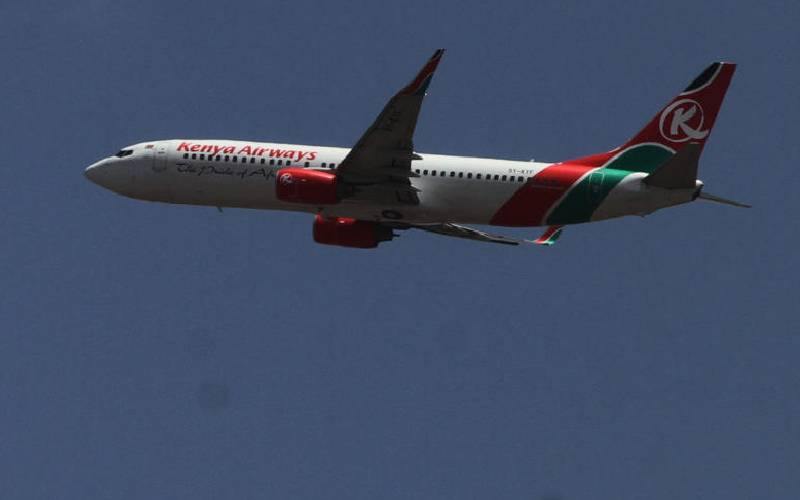
Bailouts to national carriers in Africa by respective governments have been identified as an impediment to implementing the Single African Airline Transport Market (SAATAM).
An analysis by a regional private sector lobby has noted that even when national carriers are struggling to stay afloat due to financial impropriety, governments still come to their rescue.
The analysis by East African Business Council (EABC) contained in a May 2023 study cites one of the impediments to the full implementation of SAATAM is protectionist policies by respective nations.
It cites a 2021 study by the African Union Commission, which found that at least 28 of the 55 AU member states have interests or ownership stakes in their national or main carriers within their jurisdiction.
This is even as several other states have plans to launch their own carriers.
“(This is) despite widespread evidence State-owned airlines are struggling to survive,” reads the analysis in part titled A Study on Air Space Liberalisation in East African Community (EAC).
This protectionist approach is at the expense of the Yamoussoukro Declaration, which seeks to liberalise the airspace in the continent.
The Yamoussoukro Decision seeks to harmonise air transport policies and eliminate physical barriers.
It also seeks to create an environment for the provision of safe, reliable and affordable air transport conducive to the trade of goods and services on the continent.
The decision seeks to have the signatory African states deregulate their air space. It was agreed by African ministers of 44 countries in 1999 in Ivory Coast.
Open sky policy
The Yamoussoukro Decision was then adopted by respective Heads of State in 2000 and became binding in 2002.
This is a build-up to the open skies policy.
The African Union in response to the declaration and with the purpose to fast track its implementation launched SAATAM in 2018. This is part of the AU 2063 agenda.
The objective is to achieve a unified market for air transport in the continent that provides significant freedom and access across the region.
The protectionist policies continued to be implemented even when the airlines are not doing well.
“When a national carrier continues to underperform and clear business strategies are not deployed to address the issues, protectionist policies will continue to persist, and Yamoussoukro Decision implementation will continually be constrained,” notes the EABC study.
The analysis breaks down the level of implementation of the Yamoussoukro Decision and SAATAM among EAC partner states.
Kenya’s Yamoussoukro Decision compliance is ranked low at 18 per cent. South Sudan has the highest score of 50 per cent rated as medium alongside Rwanda at 49 per cent.
They are followed by the Democratic Republic of Congo (21 per cent), Kenya (18 per cent), Tanzania (14 per cent), Burundi (6.0 per cent) and Uganda (4.0 per cent).
All the EAC partner states are signatories to the Yamoussoukro Decision. South Sudan, Tanzania, Burundi, and Uganda, however, are not signatories to SAATAM as illustrated in the analysis.
Regional blocs
When it comes to regional blocs, EAC compliance of Bilateral Air Service Agreements (BASAs) with the Yamoussoukro Decision stands at 19 per cent.
Economic Community of West African States (ECOWAS) has the highest score compliance of 59 per cent followed by the Central African Economic and Monetary Community (45 per cent), Southern African Development Community (33 per cent), Common Market for Eastern and Southern Africa (23 per cent), EAC (19 per cent).
The rest of Africa’s compliance is at 28 per cent, bringing the average to 38 per cent.
The analysis points out slow progress towards the finalisation of the Institutional and Regulatory Texts for SAATAM under EAC. More specifically, it adds, there is no clear write-up on fair or unfair competition.
“Competition regulations -although mentioned in Article 7, the Yamoussoukro Decision text did not provide any further principles or rules that would better define fair and unfair competition between operators,” says EABC.
The analysis, as one of its recommendations on how the open skies policies can be implemented in the region, calls for the development and harmonisation of competition rules.
“By the time the decision was backed on open skies, very few African countries, more specifically, were ready with their own competition legislation,” the analysis notes. It details that the first real attempt to enact a regional competition law was undertaken by the Common Market for Eastern and Southern Africa (COMESA) much later in 2000 after the decision came into force.
“It is, however, apparent that the developments in the commercial world are impacting competition, particularly when mergers, acquisitions or takeovers take place in airlines and other enterprises,” says EABC.
The lobby points out in the analysis that anti-competitive practices constitute obstacles to the achievement of liberalisation in a country’s economic activity.
“Therefore, the need for EAC governments intervention to create a level playing field and guard the EAC air transport industry against unfair and restrictive business practices is absolutely necessary,” it says.